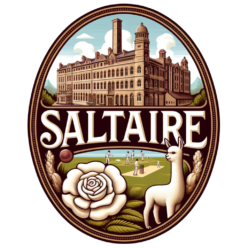Titus Salt was an English industrialist and philanthropist, born on September 20, 1803, in Morley, near Leeds, Yorkshire, England, and he died on December 29, 1876, in Lightcliffe, near Halifax.
He is most famously known for founding the model village of Saltaire in 1851.
Titus Salt had eleven children with his wife, Caroline. Their large family was a reflection of the Victorian era’s values, where large families were common among both the working class and the affluent.
Salt made his fortune in the textile industry, specifically in the manufacture of alpaca wool cloth.
He was one of the first to recognize the potential of alpaca wool, which was relatively unused in England at the time, and his business thrived as a result.
Salt was known for his innovative approaches to business, including improvements in the quality and efficiency of textile production.
Seeking to provide better living conditions for his workers, Salt moved his business from Bradford to a then-rural area, where he built Saltaire, a model village for his employees.
Saltaire included housing, schools, a hospital, a library, and recreational facilities, all designed to improve the well-being and quality of life of the workers and their families.
This approach was revolutionary at the time and reflected Salt’s philanthropic ideals and concern for the welfare of his employees.
Saltaire is now recognized as a World Heritage Site due to its historical significance and state of preservation as a Victorian era model village.
Titus Salt’s legacy is that of an enlightened entrepreneur who sought to combine business success with social progress.


One thought on “Who was Titus Salt?”